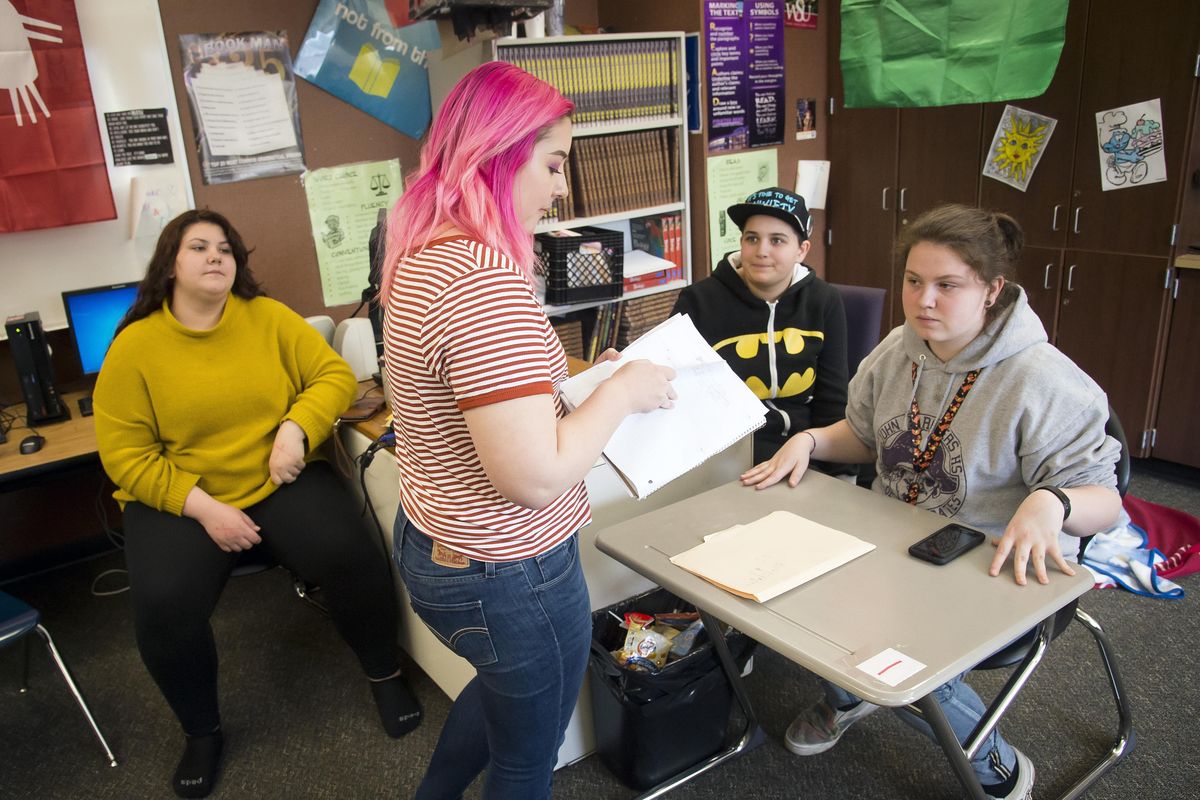At Spokane-area schools, Gay Straight Alliances reflect an evolution in attitude

When Henry Seipp became the adviser for a Gay Straight Alliance club at Shadle Park High School, the club was “a big deal.”
Some students wore “straight pride” shirts in protest of the club. Posters advertising the GSA’s meetings were torn down. Students who founded the club were harassed in the hallways.
Ironically, Seipp said all that attention had an unintended consequence. More than 60 people showed up for the GSA’s first meeting.
Now, 15 years later, much of the controversy has disappeared.
“Since then it has gone from a pretty big deal to not a big deal,” Seipp said, adding later, “I haven’t seen a group of kids making fun of a gay kid at Shadle in a long time.”
That isn’t what it was like when Seipp was in school in the 1980s. When someone at that time used a slur for gay people, that person got high-fives, he said.
Those changes reflect a broader cultural shift throughout schools in the Spokane area, according to members and advisers of local alliances interviewed recently by The Spokesman-Review. While progress has been uneven in places, they said, the prevailing attitude among young people has largely been to embrace the presence of alternate identities and orientations.
An evolution of ideas
Marybeth Smith, the principal at Lewis and Clark High School and a former adviser for North Central’s GSA, echoed Seipp.
Overall, she said, people are much more comfortable and open talking about homosexuality now. When she was in high school she had no idea that members of her peer group were most likely, statistically speaking, gay.
“We were so ignorant, frankly,” she said.
When she started as a GSA adviser at North Central, she didn’t see overt hostility, like Seipp. Instead, she saw reluctance and a hesitance by students and staff to engage.
“I remember the very first few times we did Day of Silence,” she said, referring to a national event in which students are silent for a day to bring attention to bullying. “People were respectful, but people were almost afraid to ask dumb questions.”
She attributes that general lack of conversation to ignorance, not hostility.
“I think there have been pretty radical and positive strides in the last couple years,” she said.
Courtney Lehman has been the executive director of Odyssey Youth Movement in Spokane since August and has already worked with a number of area schools. Although she doesn’t work directly with GSAs, Lehman said area schools have been quick to embrace diversity training.
“What I can tell you from my experience from these first seven months that I’ve been at Odyssey is that the schools are eager,” she said.
“The teachers and support staff and administrators are looking for language and cultural cues,” she added.
Barb Silvey, the longtime adviser for Rogers High School’s GSA, has also seen a shift, although she’s more measured in her assessment.
“It is a huge culture shift at Rogers. It is not a huge culture shift in other places,” she said. “It is still fairly dangerous in a lot of the schools around here.”
Idaho charter school under fire
Not every school has enjoyed such a smooth transformation of attitudes. In March, the Forrest Bird Charter school in Sandpoint came under fire from the Liberty Counsel, a right-leaning nonprofit legal defense organization. The charter school is one of the sites where Odyssey Youth Center has conducted training.
According to the Liberty Counsel, Mary Jensen, the principal of the charter school, allowed a transgender student to participate in the school’s GSA club against the wishes of the students’ parents.
A number of websites – like Redoubt News – picked up the story. Headlines read “Sandpoint Charter school secret gay club.”
According to a letter the Liberty Counsel sent to the school, the parent, who is not named, came to the school at lunch to drop off a sandwich and found her child in the classroom where the GSA club meeting was being held.
The mother proceeded to meet with Jensen and secretly recorded their conversation. In the two-and-a-half minute tape recording, which is available online, Jensen appears to acknowledge keeping the club’s existence on the “down low.”
Additionally, the Liberty Counsel alleges Forrest Bird Charter school staff facilitated off-campus club meetings.
Jensen declined to comment, referring instead to a statement posted on the school’s website assuring parents that the GSA club does not meet off campus.
The charter school’s lawyer, Bret A. Walther, wrote in an email: “I can say that the School denies both the version of events represented by Liberty Counsel, as well as all claims of wrongdoing.”
However, Walther declined to go into more detail, citing student privacy laws.
In a letter sent to the school the Liberty Counsel wrote, “Forrest M. Bird Schools has confirmed that it does not respect parental rights. Liberty Counsel will take further action to prevent irreparable harm to the rights of our clients, as well as the parents of other children whom the School is recruiting in the absence of their parents’ knowledge and permission.”
Pockets of resistance remain
Although Silvey believes the accusations against the Forrest M. Bird Charter school are particularly intense, she said it’s indicative of an overall resistance by some communities to have GSAs in their schools. Often Silvey hosts GSA clubs from more socially and politically conservative areas of Washington and Idaho. Those students are encountering some of the same difficulties students at Rogers High School faced 10 years ago.
“The thing that I see as the biggest thing in the way of GSAs forming is the fact that it takes a really committed adviser,” she said.
That adviser has to be willing to work hard and continually advocate for the students in the GSA.
“Most places don’t have an adviser who can sustain that,” Silvey said.